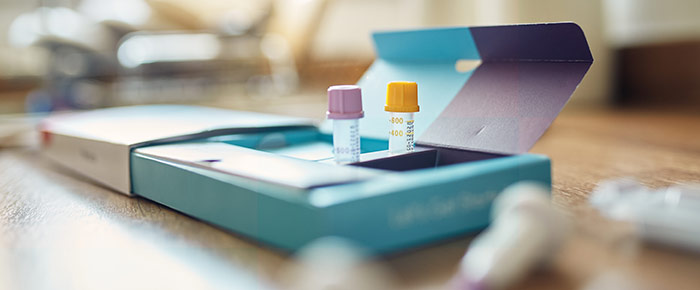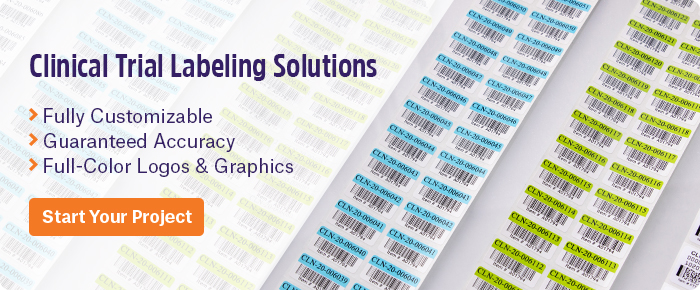
The at-home testing kit market is expected to reach $8M by 2028, with high competition in the market, as well as the convenience and rapid results being significant factors driving the increase. However, doubts still remain related to the reliability of rapid home testing kits, which might hinder their projected growth.
At-home diagnostic kits
New discoveries in the healthcare field, coupled with advances in technology, have improved patient outcomes by upgrading various healthcare sectors. Diagnostics, a critical segment of the healthcare system, has also seen considerable changes. Diagnostic tests that used to take hours, or even weeks, can now be done in minutes. These rapid tests have also become increasingly easy to use, so much so that even non-trained personnel can perform the test and get an accurate result. This development has thus led to the introduction of at-home testing conducted by the patient themselves.
Today, at-home diagnostic kits play an essential role in diagnosing and managing acute or chronic diseases, empowering patients to make better-informed decisions about their own care. At-home testing kits encompass any testing instruments that help a person perform a healthcare-related test and provide a rapid result. Health monitoring equipment is also included in this category. As such, these kits cover a variety of applications and functions used to detect and monitor medical conditions while also helping ensure the privacy and security of a patient’s healthcare information.
These at-home testing kits can be segmented into various categories based on their test type, age, sample type, and usage. Some of the most common test types include pregnancy tests, glucose tests, diabetes tests, and HIV test kits. These kits may use cassettes, strips, panels, or dip cards to perform the actual test, using various sample types, such as blood, urine, and saliva. At-home diagnostic kits can also be segmented into disposable and reusable kits. While disposable kits still represent the more significant segment of the market, medical devices and equipment used to continuously monitor a patient’s health status are on the rise. Kits for new diseases are also being developed, as is the case with new COVID-19 at-home rapid detection kits.
Common at-home diagnostic tools
Currently, some of the most common at-home diagnostic kits involve either one-time detection tools or medical devices used to monitor specific chronic diseases.
Blood glucose monitors: Amongst the most used kits in the market, blood glucose monitoring kits are typically equipped with strips and lancets. These kits are primarily used to monitor blood sugar levels in patients suffering from diabetes but can also be used to test blood sugar levels in people who have symptoms of high (hyperglycemia) or low (hypoglycemia) blood sugar. These kits have improved significantly over the years and are now available with an application that makes it easier for patients to analyze their health data using their smartphones.
Pregnancy tests: At-home pregnancy tests have been around for a while. These tests use urine to determine the levels of human chorionic gonadotropin (hCG) in the body. There are a large variety of different tests available on the market, depending on the manufacturer. However, most healthcare professionals agree that they all work more or less the same, with roughly a 99% effective rate, compared to the accuracy rate of urine-based pregnancy tests performed in a doctor’s office. Blood-based are typically more accurate but also more expensive.
Cholesterol home kits: At-home cholesterol kits allow people to measure their cholesterol levels quickly and conveniently. Unfortunately, these kits normally only measure total cholesterol levels, while some advanced kits have started offering the option to also measure HDL and triglyceride levels. Nevertheless, they are essential for individuals affected by high cholesterol, allowing them to manage their health better.
Blood Pressure monitors: The prevalence of high blood pressure in individuals has significantly increased over the past years due to lifestyle, stress, and diet. As such, it has become increasingly important for these patients to be able to monitor their blood pressure at home. Today, smart wireless blood pressure monitors are available that can be easily synchronized with smartphones. Upper arm monitors are generally considered more accurate than wrist or finger monitors.
COVID-19 Rapid Detection: Home coronavirus test kits allow people to administer their own test to detect if they have been infected with COVID-19 without waiting in endless lines at hospitals or diagnostic centers. The at-home diagnostic equipment has made it convenient for the user to conduct self-testing at home and also reduced the potential for exposure to COVID-19.
The future & growing trends
At-home diagnostic kits have shown to have a number of benefits for users, including providing confidential reporting and faster diagnoses cost-effectively. These kits are also available 24/7 to users, allowing them to get a result in real-time, no matter the time of day. The newer generation of diagnostic kits have also become far more user-friendly, proving to be beneficial and safe for older individuals and young children alike.
These new tools empower the ordinary person to take more control over their own health management. At-home testing kits now allow most medical conditions to be diagnosed and managed using a variety of portable health equipment that can be synced with smartphones and online apps. Advancement in technology is further enabling the creation of digital diagnostic kits equipped with cloud technology, even better user interfaces, and more advanced equipment.
Many companies specializing in the manufacturing of medical devices are also now entering the market with high-end diagnostic tools and kits to meet the diverse demand from different population segments. This increase in competition is expected to further drive change and growth in the market. With an ever-growing senior population and a rising awareness of the importance of personal care and health, the demand for these kits is only expected to grow. Coupled with the need to manage the emergence of unforeseen diseases, such as COVID-19, the demand for at-home diagnostic tools is likely to remain high.
LabTAG by GA International is a leading manufacturer of high-performance specialty labels and a supplier of identification solutions used in research and medical labs as well as healthcare institutions.



